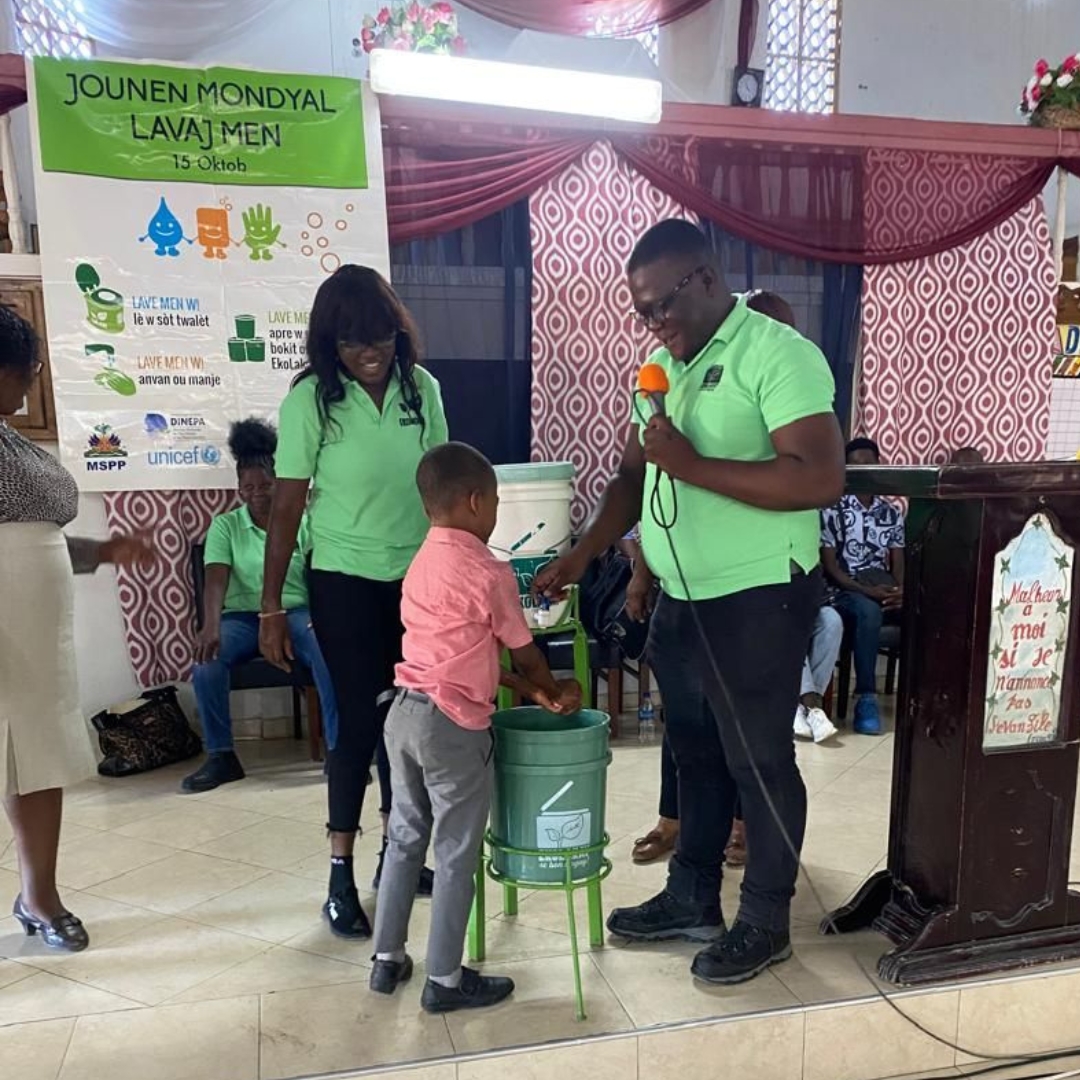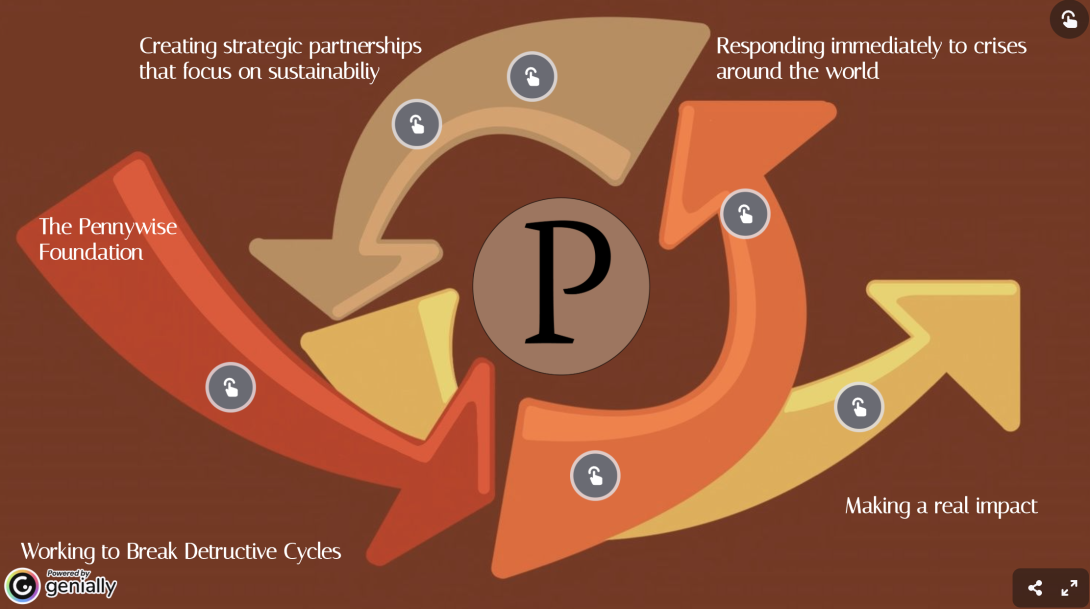Back-to-School with the Pennywise Foundation

School celebration for Global Handwashing Day with SOIL Customer Service Agents and staff.
For nearly a decade, SOIL and Pennywise have been partners in driving positive change in Haiti. Since our early days, Pennywise has provided consistent, year-over-year grant support, always stepping up to meet the evolving needs of our staff and services. This unrestricted, flexible support is critical to SOIL’s development as an organization and is deeply meaningful for our staff.
The generosity of Pennywise enables SOIL to provide financial support to help pay for school fees for the children of SOIL staff, a meaningful investment that supports the education of Haiti’s next generation of leaders, change-makers, engineers, and advocates and strengthens team morale.
We recently had the chance to sit down with Pennywise’s co-founder, Liz Subin, to learn more about what makes Pennywise’s giving model unique, their organization’s core values, and touch on the joy that they find in their partnership with SOIL.
To start, could you share a bit about Pennywise’s story? What inspired you and Laura to dedicate yourselves to this work–and what keeps you going?
For starters Laura is my little sister and my boss. She’s a practicing attorney who’s spent most of her career working with organizations advocating against domestic violence. Her passion lies in women helping women and promoting gender equality and has worked with several nonprofits in that field. Through her early career experiences, she began to notice sector-wide issues in how non-profit funding is structured.
At that same time, I was working on my master’s degree and doing wildlife conservation research in the Caribbean. I had similar frustrations. Working with nonprofits made me a bit jaded about how much could really be achieved through traditional methods of philanthropic giving.
Laura and I would talk often about how, if a few key things about how nonprofits received funding were changed, their impact could be much greater. That’s when we had an idea:
What if we built an organization that celebrates what works, instead of focusing on what doesn’t? What if we built grantee relationships on trust instead of paperwork-heavy reporting for short-term projects?
At Pennywise, we have a set of criteria in place for all of our grantees that measures their ability to be self-sustaining and make a lasting impact in their field of work.

We made our first grant in 2015, and since then we’ve awarded more than 3 million dollars to some really kick-ass organizations. Pennywise prioritizes programming that has self-sufficiency, for both the work and its beneficiaries, at the heart of its design. We envision our grants as investments that will be leveraged to create impacts that grow to be more and more sustainable over time.
How did Pennywise first connect with SOIL, and how has this partnership evolved over time?
Working with SOIL has been such a powerful experience. For me, learning about Haiti—its incredible history and the forces that have shaped it—was eye-opening. I had no idea about things like the “freedom debt” France imposed after Haiti’s successful slave revolt in 1804, or the many ways foreign powers have actively undermined Haiti’s development.
Amidst all of that, discovering SOIL’s work has been like finding a bright light in the dark. It feels good to support such creative, dignified, and essential solutions in the face of extremely challenging circumstances.
Honestly, especially during times like right now, it’s emotional for me to see communities in Haiti just keep getting hit—Haiti faces so many hurdles. But it’s a true joy and privilege to address this through the work that we do with Sasha and the SOIL team and we feel lucky to be in a position to be able to support their top priorities.
For me, going to work everyday and focusing on what works rather than what’s broken is very uplifting.
What has been the most rewarding aspect of the SOIL-Pennywise partnership?
Once we have a relationship with a grantee we are more than happy to offer unrestricted grants, and SOIL has done a great job of taking us up on that offer. There are not a whole lot of discretionary funds within a traditional grant model to be able to pay for something like children of staff’s school fees, but Pennywise can do that.
For Pennywise to be able to get a phone call with a grantee, hear what they need funded and say “sure thing, we can do that” is exactly what we’re here for. We practice trust-based, relationship-based philanthropy. And the most exciting thing about the last decade spent doing this with SOIL is that we can see that it WORKS!
Pennywise can confidently tell our donors: SOIL delivers. Every dollar makes a real impact. In fact, SOIL helps Pennywise explain our mission and vision through the example of their work in Haiti. SOIL is a sort of poster child for our values, and we often use this partnership as an example of what trust-based funding can look like.
We are deeply inspired by the work of grantees like SOIL who embrace the Pennywise model and are able to do more with less to bring lasting change to communities around the world.
Can you share a little more about the school fees program?
This initiative really highlights the kind of donor relationship we aim to foster—centered on trust and responsiveness. SOIL knows your community’s needs far better than we ever could.
From our perspective, it's about empowering local leadership and showing donors how creative, human-centered support can really improve lives. And us, being in our little bubble in Vermont, would never have guessed that school fees were a top need for SOIL’s staff-but it makes sense and our donors are thrilled to support it. More confidence is instilled in a donor when they know that their dollars are going towards a community-identified need rather than a perceived or prescriptive need.
Pennywise gives its grantees wide discretion in how funds are used. Can you elaborate on what trust-based philanthropy looks like in action?
The Pennywise model centers around strengthening relationships over time. We aim to demonstrate that multi-year, unrestricted funding truly works. Trust-based philanthropy allows organizations to respond to urgent needs and cover unexpected costs—things traditional funding models often overlook.
We also believe the application and reporting process should be simple and accessible. Our application is designed to take less than 30 minutes, and reporting should take no more than an hour annually. The goal is to remove barriers and reduce the administrative burden so that small organizations can focus on doing the great work they’re already doing.
Last year, one of our Georgetown graduate students reviewed the matrix and criteria we use to select grantees. We laughed remembering how, in the early days, our process was based almost entirely on intuition—that gut feeling when you meet someone and think, “That person is AWESOME!” How do you understand or begin to quantify that?
One key takeaway from that reflection is that we typically work with organizations whose operating budgets are $2 million or less—that’s our definition of “small.” But we often make exceptions, because some larger organizations are incredibly effective at stretching smaller grants. One example is our partner Alight, which works with refugees around the world. Before and after a major USAID funding cut, they launched Light 365, a program born when their CEO—who received a $500/day stipend—asked, “What if I give that $500 directly to the refugee community and let them decide how to use it?” That idea turned into 17 community-driven projects funded with just $10,000 total. One woman used her $500 to start a soap business in a refugee camp, helping to improve health and hygiene in her community.
Giving communities the power to design and lead their own solutions is exactly what we want to elevate and what trust-based philanthropy allows to happen.
Anything else you’d like to share?
We’ve built Pennywise around the idea of leveraging what works—and we want to foster collaboration, not competition, among grantees. I think that we are continually striving to find ways to do philanthropy better, and form partnerships that act as examples of what it means to give well.
Thank you, Liz, for chatting with us—and for you and Laura’s unwavering support of SOIL’s mission to promote social justice and human rights in Haiti. We look forward to many more years of working together and continuing to bring a light to showcase what’s working and promote SOIL’s success in transforming waste to resources in northern Haiti.